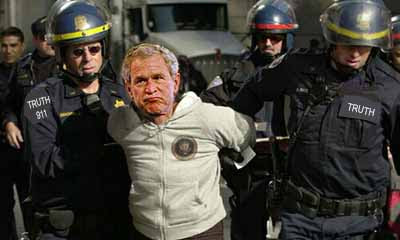
I'm with the folks over at Tom Paine.
It's inquest time.
And blogger Robert Borosage says it best.
(...)We have witnessed a staggering abuse of power by President Bush. Even former Bush Justice Department officials now charge him with trampling the Constitution. Bush has claimed the prerogative to declare an endless war without congressional approval, to designate someone an enemy without cause, to proceed to wiretap them without warrant, arrest or kidnap them at will, jail them without a hearing, hold them indefinitely, interrogate them intensively (read torture), bring them to trial outside the U.S. court system. He claims that executive privilege exempts his aides — even the aides of his aides and his vice president's aides — from congressional investigation. He claims the right to amend or negate congressional laws with a statement upon signing them. And much more.
Even this Supreme Court, stacked with activist right-wing judges enamored of executive national security powers, has rebuked the president on some of these claims, particularly around the treatment of alleged enemy combatants. But many of Bush's claims will escape judicial determination.
And there is the rub. According to the leading case on presidential powers, if Bush's extreme assertions of power are not challenged by the Congress, they end up not simply creating new law, they could end up rewriting the Constitution itself. Inaction can alter the Constitutional division of powers by establishing the president's claims as authority that the Congress or the courts may not infringe.
Borosage goes on to cite The Steel Seizure case — Youngstown Sheet and Tube v Sawyer, 343 U.S. 579 (1952) and here's hoping Truman Dem shows up at the Frog to interpret the court decision into understanding for all us lay Froggers.
Apparently Youngstown is "...the leading case on presidential power. In Youngstown, a six-member majority of the Court joined in overturning President Truman's executive order nationalizing the steel plants to end a strike during the Korean War. Justice Black wrote the opinion for the Court, but the historically influential opinions were penned by Justices Robert H. Jackson and Felix Frankfurter, both Democratic appointees."
What the Court said in Youngstown is that if presidents assert a prerogative, such the power to make war without a congressional declaration — systematically, with unbroken regularity, with the knowledge of the Congress and are never questioned — then that practice becomes a Constitutional power that cannot be infringed upon by the Congress or the Courts.
Which I take to mean--Congress better get off the pot and schedule an inquest pronto or risk "indifference or quiescence".